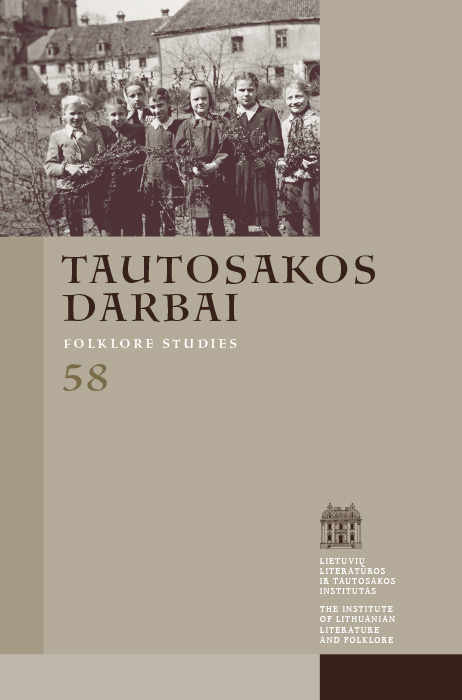Reception of Folksongs in the Lithuanian Press of the National Revival
Abstract
The article discusses the folksong reception against the background of the Lithuanian press from the second half of the 19th – beginning of the 20th centuries. The analyzed material includes periodical publications of that time elaborating on various issues of the folksong tradition, and miscellaneous published sources of the folksongs. The author seeks to establish what kind of folksong notion was shaped and promoted in the public discourse represented by the Lithuanian intelligentsia that was actively involved in the movement of the national revival. Besides, the analyzed material is examined in order to find evidence from the society at large – whether it accepted the cultural notions presented by its enlightened part.
The first part of the article contains a survey of the folksong publication tendencies. The author also attempts to grasp the impact that various folksong publications had on the oral tradition. The Lithuanian folksongs have been established in the written culture since the end of the 18th – beginning of the 19th century. Their first publications were meant exclusively for the educated readership and became relevant in esthetical or historical aspects in various scholarly works or fiction. However, prerequisites for the folksong publications to reach the third social estate (the Lithuanian peasants) formed only in the second half of the 19th century. During this time, distinct attempts from various social groups at reflecting on folklore became increasingly visible, thus marking a significant shift in the social self-consciousness, which was brought about by two important factors. One of them was the movement of the national revival that accommodated all the social groups of the Lithuanian population and emphasized the significance of the ethnic culture in the process of creating the modern nation. Active participants of this movement, the majority of which comprised the Lithuanian intelligentsia of peasant descent, recognized the folk poetry as the sign of Lithuanian national distinction. Another factor was the growing Lithuanian secular press, which actively shaped the public attitude towards folklore, at the same time effecting distinct changes in the folksong tradition as well.
The folksong publications from the period in question (scholarly and popular collections, sparse or occasional publications in the periodicals, or instances of usage in the literary fiction and journalism) enhanced the relevance of the oral tradition in various ways: the folksongs enabled emphasizing the uniqueness of the Lithuanian culture, while their spread was aimed at popularization and revival of the folksong tradition itself.
Another part of the article focuses on the different ways of reflecting on the folksong tradition. The public cultural discourse regarded folksongs as a particularly important heritage, emphasizing their significance as a historical, ethnographic, or linguistic source. Besides, adhering to the folklore interpretation pattern established from the end of the 18th century resulted in evaluation of folksongs according to the ethical and aesthetical criteria. The folksongs were used in order to define the Lithuanian national character, while their comparison with folksongs of other peoples served for the attempts at establishing the exceptional or superior nature of the Lithuanian culture. Similar arguments that had been used to prove the folksong significance served to foreground the importance of their collection: folksongs merited preservation as an important scholarly, historical and cultural source that ensured continuity of the Lithuanian culture.
The intelligentsia was the first to favorably respond to the attempts at enhancing the importance of the folksong tradition. While the reaction of the broadest social masses towards the narrative of the high value of folksongs promoted in the public discourse manifested itself simply as their active involvement in the folksong collection – whether in response to the public claims voiced by the intelligentsia or in result of their inner cultural aspirations.
Downloads
Most read articles by the same author(s)
- Jurgita Ūsaitytė, Song as a Propaganda Tool: Surveying the Soviet Time Songbooks , Tautosakos darbai: Vol. 65 (2023): Tautosakos darbai
- Vita Džekčioriūtė, Aušra Žičkienė, Jūratė Šlekonytė, Gražina Kadžytė, Jurgita Ūsaitytė, Lina Būgienė, Daiva Vyčinienė, Chronicle , Tautosakos darbai: Vol. 48 (2014)
- Audronė Gedžiūtė, Jūratė Šlekonytė, Jurgita Ūsaitytė, Vita Ivanauskaitė-Šeibutienė, Chronicle , Tautosakos darbai: Vol. 57 (2019)
- Jurgita Ūsaitytė, The News in Album Studies (Two Case Reviews) , Tautosakos darbai: Vol. 52 (2016)
- Jurgita Ūsaitytė, Personal Collections of Texts from the Second Half of the 19th Century along with Their Historical Context , Tautosakos darbai: Vol. 55 (2018)
- Jurgita Ūsaitytė, Foreword , Tautosakos darbai: Vol. 48 (2014)
- Jurgita Ūsaitytė, Songbooks as a Mode of Personal Notes , Tautosakos darbai: Vol. 50 (2015)
- Jurgita Ūsaitytė, Foreword , Tautosakos darbai: Vol. 63 (2022)
- Jurgita Ūsaitytė, Foreword , Tautosakos darbai: Vol. 59 (2020)




